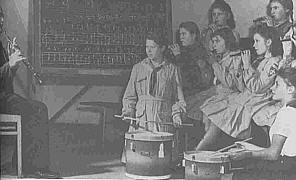|
SCOUTING
One activity
that gained popularity in the DP camps was scouting. Boy Scouts, Girl
Scouts, Girl Guides, Sea Scouts, Relief Scouts, and several national
and religious variations. The scouting troops and the entire scouting
structure were revived immediately after the liberation of Germany due
to the activism of a relatively large number of prewar leaders, who
frequently worked also as teachers.

Scouting
provided DP children and youth with activities that developed camaraderie
and friendship, such as sports, field trips, summer camps, and scout
jamborees. There were some 25,000 scouts in the U.S. Zone of Germany
by the spring of 1946.
The Polish
Scouts published their own journal, cared for Polish graves on German
soil, visited Polish patients in hospitals and inmates in prisons, helped
to care for the DP camps, and arranged classes in various practical
skills. They helped to organize religious, national and scouting celebrations.
The entire camp of Heilbronn participated in the blessing of the scout
community center and the opening of a kiosk with books and newspapers
in care of the scouts. Artistic programs included dancing, and recitation,
as well as a theater performance and a gymnastic show.
The Ukrainian
Scouts were fond of camping and participated in Ukrainian plays and
choir concerts, they worked in vegetable gardens, flower gardens, schools
and barracks. They organized hospital visits to take comforts and reading
material to the patients. During the summer camp on Lake Fuschl, they
helped with the harvest and with many jobs in the village.
Part of
the drive behind scouting and school movements originated in the DPs'
fears of other, alien, influences on their children in the chaos of
post war Europe. Evil examples were concentrated in the narrow territory
of the camps. Often times children would re-enact quarrels, and physical
violence that they had witnessed among the adults. One DP mother asked,
"Is it right for growing children to see such things?" With the intervention
of schools, scouting and adult concern the displaced children of Europe
emerged from the physical and spiritual ruins of the Continent to make
their way with new strength into the postwar world.
Sources:
DPs Europe's Displaced Persons, 1945-1951 by Mark Wyman
Polish Schools in DP Camps in Germany1945-1951 by A. D. Jaroszynska_Kirchmann
|
|